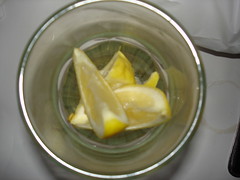
Last night, I went out to eat with some of my friends after seeing the movie "Pirates of the Caribbean." My girlfriend mentioned that we had been "doing nothing but eating" since we had been at a beach barbecue right before the movie (which we did have a lot of food at, incidentally.) The topic shifted over to "diets" and it went wayside of scary crazy.
"I just finished with my seventh day of the lemonade diet!" One girl said happily to the group. My friend Ryan filled us in on the details. Apparently his parents swear by the health and happiness that results from drinking a quart of seawater every morning and consuming nothing but lemonade+maple syrup+cayenne pepper. Oh, laxative teas are tossed in every once and a while. It had cleared out the yellows in his mom's eyes, did wonders for removing toxins from their bodies and gave them cleaner energy.
The girl that tried the diet as well said that she was hungry at first, but then it went away and her mood improved, her mind cleared and she felt so much better. (My girlfriend got a load of attitude from her when we first met her before the movie started, so we did not really get to see any positive moods from her.)
Then, Ryan piped up with his own feelings about the diet. "It was horrible. I was bedridden for days, I didn't have any energy and I started puking up blood." His parents used seasalt instead of regular tablesalt for the diet and it probably tore up his stomach.
Puking blood is not the healthy part of any diet, the "master cleanse" included. The girl amended that her own doctor didn't recommend the diet -- he strongly advised to limit it to three days if she decided to do it.
"Soooo.... what was the name of this diet? Who was the health expert that recommends it?"
I asked, both concerned and curious.
"Oh, you can find it on the internet," they said almost dismissively. "Its called the lemonade diet."
-------------------------------------
I did a little bit of poking around and I found links to pamphlets of books called the "Healing for the Age of Enlightenment (1993)" and "The Master Cleanser (1976)" by Stanley Burroughs. Amazon.com has some reviews by health nuts who rave about it and lawyer-types who rant about it. Apparently, Mr. Burroughs was charged with second degree murder for treating a person with leukemia without a medical license. The murder conviction was later overturned by the Supreme Court of California.
It is important to take the testimonials of people who try something like the lemonade diet with a grain of salt (pun intended.) There can be serious health complications and even worse results if the treatment oversteps its bounds as a "detoxification and cleansing diet" into its claims that it can magically heal all sorts of diseases. Leukemia is NOT something that can be healed with some lemonade and cayenne pepper; it takes serious knowledge to become a respectable medical practitioner.
Orac at Respectful Insolence says it best in a post about understanding alternative medicine "testimonials" for cancer treatments:
Never forget that alternative medicine testimonials exist largely for one purpose: To sell a product. Most of them are advertisements, nothing more. They are no more "unbiased" than pharmaceutical advertisements for their latest, greatest drug. In fact, they are worse, because at least the pharmaceutical companies have to be able to back up their claims with science and disclose potential adverse reactions in their ads. No such requirements exist for most alternative medical treatments, mainly because most of them claim to be supplements rather than medicines. The other problem with testimonials is that they don't rise even to the lowest level of medical evidence, the anecdotal report. Anecdotal reports in medicine require a careful documentation of symptoms, lab tests, diagnoses, exact courses of treatment, and a patient's response to treatment. Testimonials almost never present these elements in sufficient detail to judge whether the treatment actually did anything. There's just no way of telling truth from exaggeration or fiction.If you ever read something on the internet that sounds too good to be true and they are trying to sell you something... be careful. Fact-check on reliable webpages. Read user comments and criticisms. Don't fall victim to hype and spin.





have you read about the breatharians yet? (wikipedia time!)
ReplyDelete